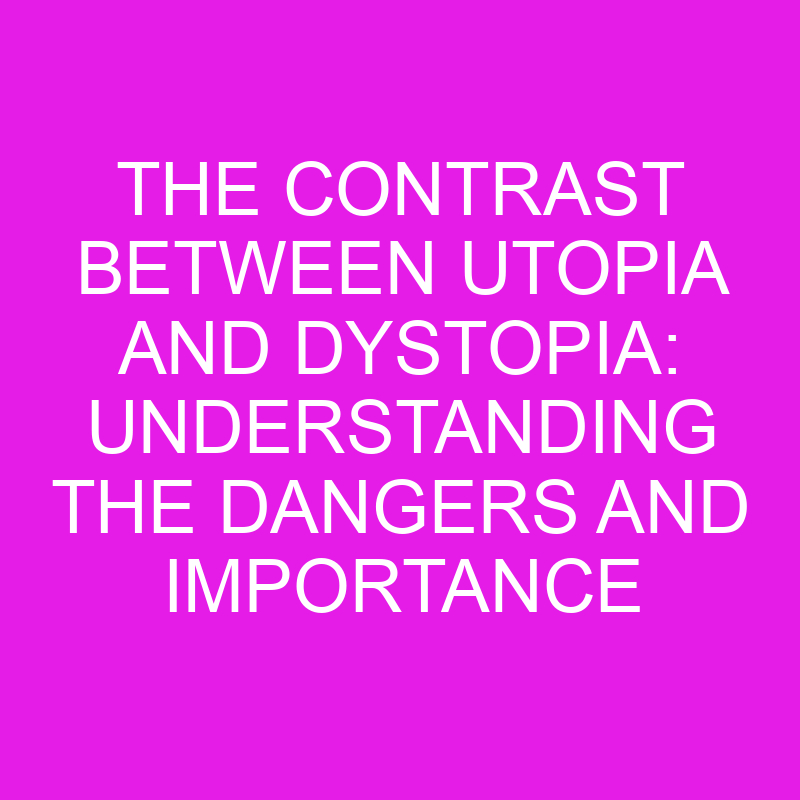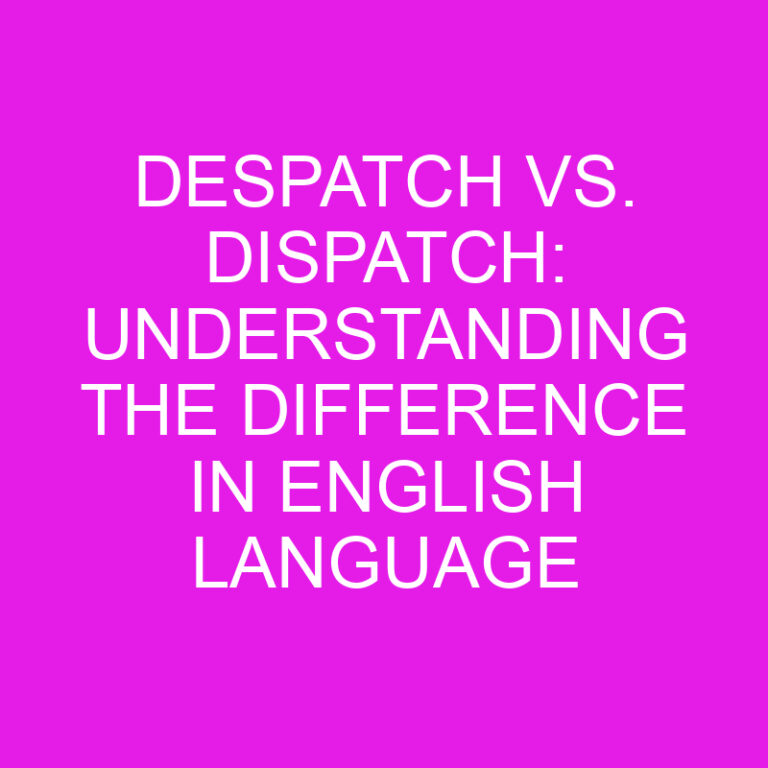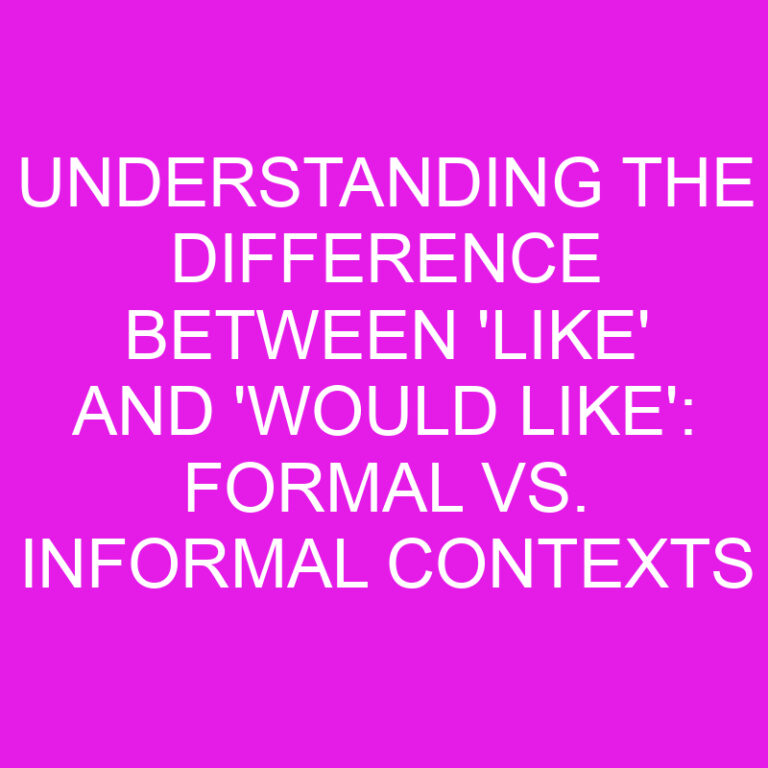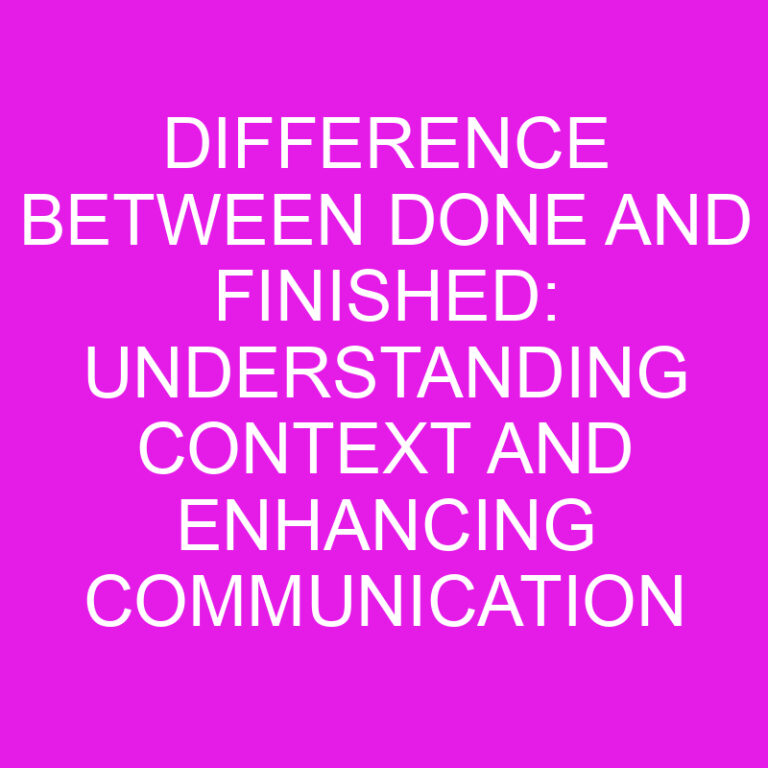
Have you ever wondered what separates a utopia from a dystopia? These two concepts are often used in literature and popular culture to depict contrasting visions of society. In this article, I’ll explore the fundamental differences between utopia and dystopia, shedding light on their distinct characteristics and implications. Whether you’re a fan of science fiction or simply curious about the possibilities of human civilization, understanding these concepts is key to navigating the complex world of speculative fiction. So, let’s dive in and unravel the contrasting realms of utopia and dystopia, and discover what lies beneath their seemingly idyllic or nightmarish facades.
Post Contents
Key Takeaways
- Utopia is an idealized society characterized by social equality, peace, abundance, progressive values, intellectual freedom, strong community, and the elimination of discrimination.
- Utopian societies exist solely in the realm of imagination and are subjective interpretations of what constitutes an ideal society.
- Dystopia is the opposite of utopia, representing a society characterized by oppressive governments, restricted individual freedoms, social, economic, and technological problems, lack of diversity, and fear and surveillance.
- Dystopian societies serve as cautionary tales and reflections of potential consequences of unchecked power.
- Utopia and dystopia are contrasting concepts that help us reflect on the importance of safeguarding our freedoms and promoting a society that values individuality, critical thinking, and the well-being of all.
Definition of Utopia
When it comes to understanding the concept of utopia, it is important to delve into its meaning and implications. Utopia is a word derived from the Greek, meaning “no-place.” It was first coined by Sir Thomas More in his 1516 book titled Utopia. In this work, More presents a fictional island society that embodies an ideal civilization. Since then, the term has been used to describe a perfect or idealized society.
In a utopian society, everything appears to be harmonious and perfect. There is social equality, peace, and abundance. People live in a state of bliss, free from conflict and suffering. Utopias are often depicted as idyllic and picturesque, showcasing the best version of humanity and its capabilities.
However, it is vital to remember that utopias exist solely in the realm of the imagination. They are visionary constructs that highlight human aspirations and desires for a better world. While utopian visions can serve as sources of inspiration and motivation, they are unlikely to be fully realized in reality.
Moreover, utopias can be subjective and vary in their interpretations. What may be considered a utopia for one person may not hold the same appeal for another. Different cultures, societies, and individuals have diverse beliefs and values that shape their perception of an ideal society.
In literature and popular culture, utopias are often contrasted with dystopias, which depict nightmarish and oppressive societies. This juxtaposition helps to highlight the flaws and limitations of utopian ideals, offering a critical perspective on the potential dangers of striving for an unattainable perfection.
Without a doubt, the concept of utopia has captured the imagination of authors, philosophers, and thinkers throughout history. While we may never achieve a true utopia, exploring these idealized societies helps us reflect on our own world and imagine possibilities for a better future. So let’s now turn our attention to the contrasting counterpart – dystopia.
Characteristics of Utopia
In examining the concept of utopia, it is important to understand the key characteristics that define this idealized society. While utopias can vary in their specific details, there are certain common features that often appear in descriptions of these perfect worlds. Here are some of the main characteristics of utopia:
1. Social Equality: A utopian society promotes equality among its citizens. In such a world, there are no hierarchies based on social status, wealth, or power. Everyone is treated fairly and has equal opportunities and access to resources.
2. Peace and Harmony: Utopias are marked by a sense of peace, tranquility, and harmony. Conflict and violence are minimized or eliminated altogether. People coexist peacefully, resolving disagreements through open dialogue and cooperation.
3. Abundance: Material wealth and resources are plentiful in a utopian society. There is an abundance of food, shelter, and basic necessities for all citizens. Scarcity and poverty are overcome through efficient resource management and equitable distribution.
4. Progressive and Sustainable Values: Utopias prioritize progressive values such as justice, sustainability, and environmental consciousness. These societies strive for the well-being and happiness of both present and future generations. They implement policies and practices that promote long-term sustainability and minimize harm to the environment.
5. Intellectual and Creative Freedom: Utopias encourage intellectual pursuits and foster creativity. They provide spaces and opportunities for individuals to express their thoughts, ideas, and artistic endeavors freely. Freedom of expression and thought are highly valued and protected.
6. Strong Sense of Community: Utopian societies emphasize the importance of community and social cohesion. People in these ideal worlds actively engage with each other, forming meaningful relationships and supporting one another. The well-being of the community is prioritized over individual interests.
7. Elimination of Discrimination: Utopias are characterized by the absence of discrimination based on race, gender, religion, or any other factor. Every individual is respected and valued for their unique qualities and contributions to society.
While the concept of utopia serves as an inspiring ideal, it is important to acknowledge that achieving a perfect society is highly improbable. However, exploring these characteristics can offer insights into our own world and inspire us to work towards creating a better future.
Examples of Utopian Societies in Literature
Utopian societies have long fascinated authors and readers alike, serving as a source of inspiration and a way to explore different social and political possibilities. Let’s dive into some notable examples of utopian societies in literature:
- Brave New World by Aldous Huxley: In this dystopian novel, Huxley presents a future society that appears perfect on the surface but is built upon rigid control, social conditioning, and the suppression of individuality. The citizens of this world are engineered and categorized into different classes, with a focus on stability rather than personal freedom.
- The Giver by Lois Lowry: Set in a seemingly ideal society, this novel follows the story of Jonas, who discovers the dark secrets hidden beneath the superficial harmony. The community in the book eliminates pain, conflict, and individual choices by removing memories and emotions, ultimately raising questions about the value of humanity and the importance of individuality.
- Utopia by Thomas More: Often considered the seminal work on utopian societies, More’s book depicts an island society based on principles such as social equality, provision of basic needs, and communal living. It explores the idea that eliminating greed and private property can lead to a harmonious existence.
- The Dispossessed by Ursula K. Le Guin: Le Guin’s novel presents a contrast between two worlds, one being an anarchist society on the moon and the other a capitalist society on Earth. By highlighting the flaws in each system, the book offers a nuanced exploration of power, freedom, and societal structures.
- Walden Two by B.F. Skinner: Skinner’s novel introduces a fictional community based on the principles of behavioral science and operant conditioning. It explores the possibility of creating a utopian society through scientific management and shared decision-making.
These examples of utopian societies in literature offer thought-provoking insights into various aspects of human nature and social structures. While they may not provide a clear roadmap for achieving a perfect society, they encourage us to question our own world and strive for continuous progress.
Critiques of Utopian Societies
While utopian societies may seem like a perfect solution to the problems of the world, they are not without their critics. The concept of a utopian society is often seen as unrealistic and idealistic, and many argue that it is simply impossible to achieve. Here are some common critiques of utopian societies:
- Lack of Individual Freedom: One of the main criticisms of utopian societies is that they often prioritize the needs of the community over the rights of the individual. In these societies, individuality and personal freedoms may be sacrificed for the greater good of the collective. Critics argue that this kind of societal structure can lead to oppression and the suppression of individual expression.
- Inequality: Another concern is that utopian societies often struggle to address the issue of inequality. While they may strive for equality among their members, it is difficult to create a society where everyone is truly equal in terms of wealth, power, and opportunities. Some argue that attempting to eliminate all forms of inequality is an unrealistic and ultimately unachievable goal.
- Stagnation: Utopian societies are often criticized for their potential to stifle progress and innovation. In a world where everything is perfect and there is no room for improvement, some argue that society may become stagnant and lack the necessary drive for change and growth. This can lead to complacency and a lack of motivation to strive for continuous improvement.
- Lack of Diversity: Utopian societies are often portrayed as homogenous and lacking in diversity. Critics argue that this kind of uniformity can be detrimental to the development of a truly inclusive and vibrant society. Embracing diversity and allowing for different perspectives and ideas is seen by some as essential for progress and a thriving society.
- Human Nature: Lastly, critics of utopian societies argue that the fundamental nature of human beings is incompatible with the idea of a perfect society. They believe that human nature is inherently flawed and that no amount of societal restructuring can eliminate the potential for greed, power struggles, or other negative behaviors.
While utopian societies may be an intriguing concept, it is important to acknowledge and consider the critiques they face. By examining these criticisms, we can better understand the complexities and challenges of creating a truly perfect society.
Definition of Dystopia
In order to understand the difference between utopia and dystopia, it is important to first define what dystopia actually means. A dystopia is a fictional society or community that is considered to be undesirable or frightening. It is the opposite of a utopia, presenting a vision of a world that is plagued by various negative qualities and characteristics.
Dystopian societies are often characterized by oppressive governments or ruling bodies that enforce strict rules and control over the population. In these societies, individual freedoms and liberties are often restricted or completely taken away. The government may have absolute power and may use propaganda and surveillance to maintain control over the people.
Another defining feature of dystopias is the presence of social, economic, or technological problems that lead to widespread suffering and unhappiness. These societies are often marked by poverty, inequality, and a lack of basic resources. The citizens may live in constant fear and struggle to survive in harsh conditions.
Furthermore, dystopian societies often lack diversity and individuality. Conformity is highly valued and any deviation from societal norms is met with severe consequences. The citizens may be forced to conform to a strict set of beliefs, behaviors, or even physical appearance.
The defining characteristics of a dystopia include:
- Oppressive governments or ruling bodies
- Restricted individual freedoms
- Social, economic, or technological problems leading to suffering
- Lack of diversity and individuality
Understanding the definition of dystopia is crucial in order to recognize the key differences between utopia and dystopia and to better appreciate the complexities and challenges that each concept presents.
Characteristics of Dystopia
Dystopias are characterized by a range of factors that create an atmosphere of fear, oppression, and a sense of a bleak future. These characteristics play an essential role in distinguishing dystopia from utopia. Let’s delve into some key features of dystopian societies:
- Totalitarian Governments: One of the defining characteristics of a dystopian society is the presence of oppressive and authoritarian governments. These governments exert complete control over the lives of their citizens, often through surveillance, censorship, and manipulation. Individuals are stripped of their basic rights and freedoms.
- Restricted Individual Freedoms: In dystopian societies, individual liberties and freedoms are severely curtailed. Personal expression, creativity, and independent thought are often suppressed or punished. People are expected to conform to strict societal norms and are punished for deviating from them.
- Social, Economic, and Technological Problems: Dystopian societies are plagued by various social, economic, and technological issues. These problems contribute to a sense of hopelessness and despair. Economic inequality, poverty, scarcity of resources, and environmental degradation are common themes in dystopian narratives.
- Lack of Diversity and Individuality: Dystopias typically suppress diversity and aim to create a homogenous society. People are expected to conform to a particular ideology, dress code, or lifestyle. Individuality is discouraged, and any form of dissent is met with severe consequences.
- Fear and Surveillance: Fear is pervasive in dystopian societies. Governments often instill fear as a means of control, using surveillance, propaganda, and manipulation to maintain their power. Citizens constantly live under the scrutiny of a watchful eye, fearful of the consequences of their actions or even thoughts.
These characteristics of dystopia paint a vivid picture of the dark and bleak nature of these fictional societies. By understanding these key elements, one can begin to comprehend the complexities and challenges presented by dystopian worlds.
Examples of Dystopian Societies in Literature
Dystopian societies have captured the imagination of authors for centuries, serving as cautionary tales and thought-provoking reflections of our own world. Here are a few notable examples of dystopian societies found in literature:
- “1984” by George Orwell: Set in a totalitarian society controlled by the omnipresent Party, “1984” depicts a world where every aspect of individuals’ lives is surveilled and manipulated. Big Brother, the Party’s leader, enforces conformity, erases history, and suppresses independent thought.
- “Brave New World” by Aldous Huxley: In this novel, society is controlled by a strict caste system and the use of genetic manipulation and mind-altering drugs. Individuality is suppressed in the pursuit of stability and pleasure, with citizens numbed to the harsh realities of their world.
- “The Hunger Games” by Suzanne Collins: Set in a post-apocalyptic North America, this series portrays a dystopian society where citizens are divided into districts and forced to participate in annual televised fights to the death. The Capitol exercises extreme control while the districts suffer from poverty and oppression.
- “Fahrenheit 451” by Ray Bradbury: In Bradbury’s novel, books are banned, and the government seeks to control knowledge and prevent critical thinking. Firefighters are tasked with burning any books that are discovered, perpetuating a society where ignorance is the norm.
These examples showcase the diverse ways in which dystopian societies can manifest, but they all share common themes of government control, oppressive regimes, and the suppression of individual freedoms. These stories prompt us to question our own society and the potential consequences of unchecked power.
Understanding the complexities and challenges presented by dystopian worlds helps us reflect on the importance of safeguarding our own freedoms and promoting a society that values individuality and critical thinking.
Contrasting Utopia and Dystopia
In order to better understand the concept of dystopia, it is important to contrast it with its counterpart: utopia. While dystopia represents a society characterized by chaos, oppression, and hardships, utopia represents an ideal society in which everything is perfect and harmonious. Allow me to delve deeper into the differences between utopia and dystopia to provide a clearer understanding.
Utopia:
- Utopia is a term coined by Sir Thomas More in his book of the same name, and it has since become synonymous with an imagined society that is flawless.
- In a utopian society, there is perfect equality among individuals, with no social, economic, or political disparities.
- The environment is pristine, resources are abundant, and there is no scarcity or competition.
- Utopian societies often prioritize the well-being and happiness of their citizens, with systems in place to ensure their needs are met.
- Conflict and violence are non-existent, and individuals live in perfect harmony with one another.
- Dystopian societies, on the other hand, present a grim and undesirable vision of the future or an alternate reality.
- These societies are often characterized by oppressive regimes, totalitarian governments, and the suppression of individual freedoms.
- In dystopian societies, there is an extreme imbalance of power, with a ruling elite controlling and manipulating the masses.
- Citizens in dystopian societies often face surveillance, censorship, and restrictions on their personal choices and autonomy.
- Dystopian societies are plagued by societal problems such as scarcity, poverty, and environmental degradation.
It is essential to note that while utopia represents an ideal society, it is often seen as unattainable and unrealistic. Dystopia, on the other hand, serves as a cautionary reminder of what could happen if we are not vigilant in safeguarding our freedoms and individuality.
As we continue to explore the complexities and challenges presented by dystopian worlds, it is important to reflect on the importance of promoting a society that values individuality, critical thinking, and the preservation of our own freedoms. Utopia may be an unattainable goal, but by understanding dystopia, we can strive for a better future for all.
Conclusion
Understanding the difference between utopia and dystopia is crucial in recognizing the potential consequences of societal choices. Utopia represents an idealized vision of a perfect society, while dystopia serves as a warning of the dangers that can arise when freedom and individuality are suppressed.
In a utopian society, there is an abundance of resources, equality is paramount, and conflict and violence are nonexistent. On the other hand, dystopian societies are characterized by oppressive regimes, totalitarian governments, and the restriction of individual freedoms. Citizens in these societies face surveillance, censorship, and limited personal autonomy.
By exploring the concept of dystopia, we are reminded of the importance of safeguarding our freedoms and preserving our individuality. It serves as a cautionary tale, urging us to promote a society that values critical thinking, individuality, and the preservation of personal freedoms.
Understanding the contrast between utopia and dystopia allows us to make informed decisions about the kind of society we want to live in. It is up to us to create a world that cherishes individuality, upholds personal freedoms, and strives for equality.
Frequently Asked Questions
Q: What is a utopia?
A: A utopia is an idealized, perfect society where there is complete equality, plentiful resources, and no conflict or violence.
Q: How is a dystopia different from a utopia?
A: In contrast to a utopia, a dystopia is a society characterized by oppressive regimes, totalitarian governments, and the suppression of individual freedoms.
Q: What are some common features of dystopian societies?
A: Dystopian societies often have an extreme imbalance of power, with a ruling elite controlling and manipulating the masses. Citizens face surveillance, censorship, and restrictions on personal choices.
Q: Why is it important to understand dystopia?
A: Understanding dystopia is crucial as it serves as a cautionary reminder of what can happen if we fail to protect our freedoms and individuality.
Q: What values should we promote to prevent a dystopian society?
A: To prevent a dystopian society, we should promote individuality, critical thinking, and the preservation of our freedoms.






